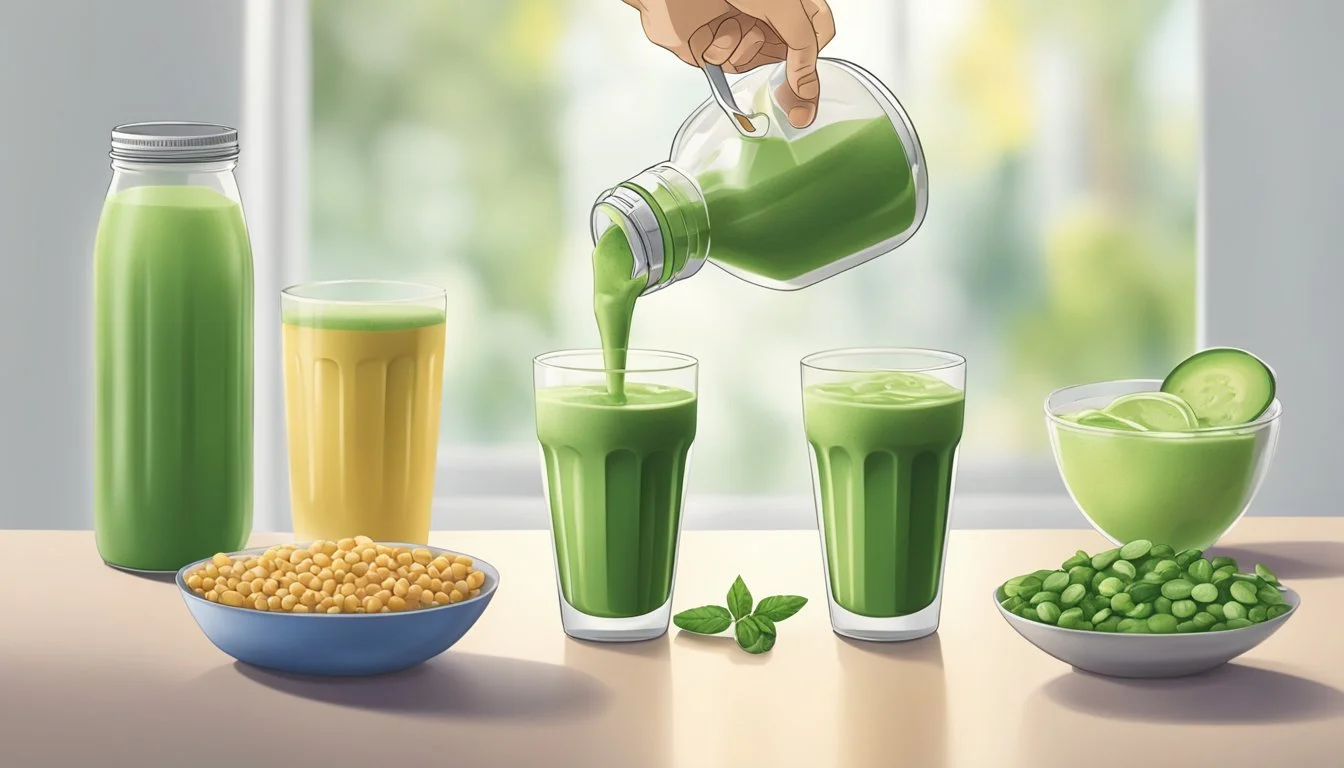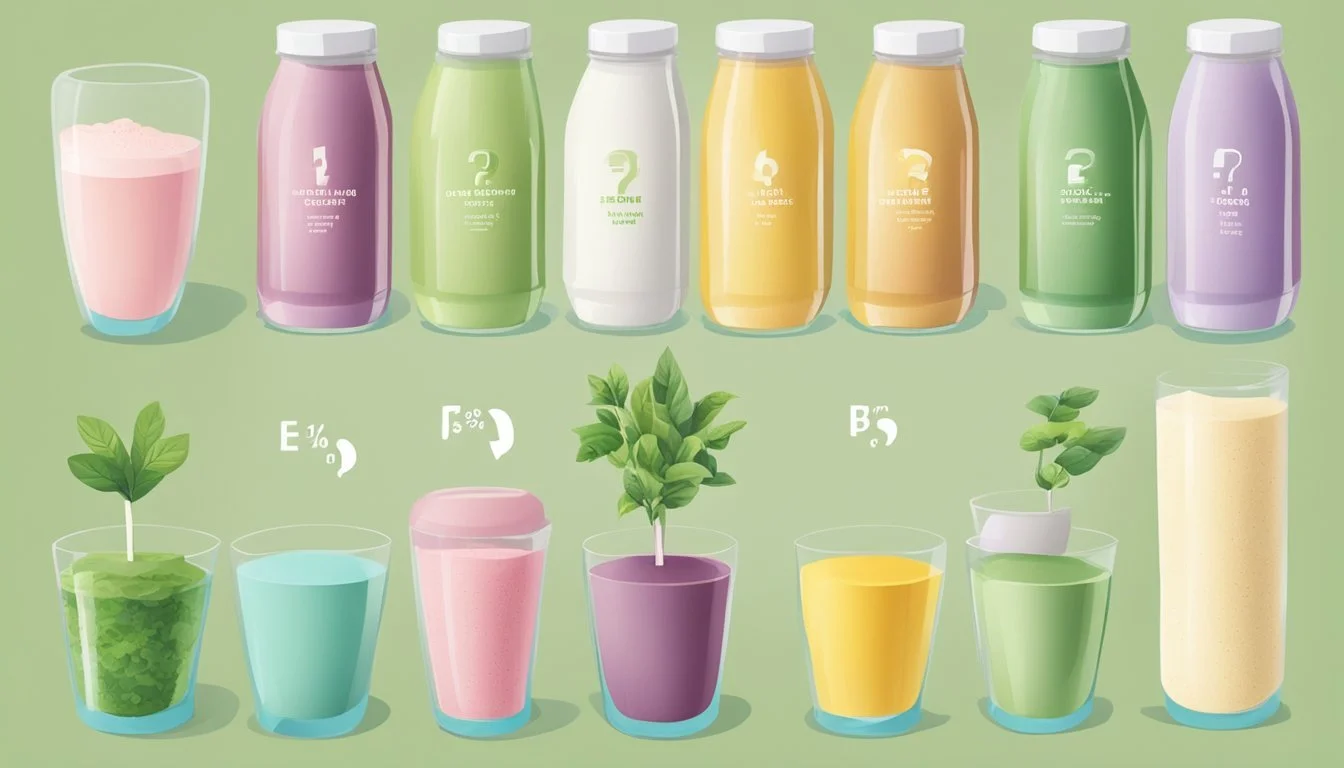How Many Servings of Plant Meal Replacement Shake Is Too Much
Guidelines and Tips
Determining how many servings of plant-based meal replacement shakes one should consume daily is important for maintaining a balanced diet. While these shakes offer a convenient and nutritious option, experts generally advise not to exceed more than one to two servings per day to avoid potential nutrient imbalances and to ensure you are also consuming whole foods.
Plant meal replacement shakes, such as Huel and Vega All-in-One, provide essential vitamins, minerals, and protein levels that can effectively substitute a meal. Many of these shakes are specially formulated to meet dietary needs, including Omega-3 ALA, Vitamin B12, and Vitamin D, making them a reliable source of nutrition.
Despite the benefits, overreliance on these shakes can lead to missing out on varied nutrients found in whole foods. Men, for instance, are advised to get between 1.2 to 1.8 grams of protein per kilogram of target body weight, suggesting moderation is key for optimal health.
Understanding Meal Replacement Shakes
Meal replacement shakes are portable and often used by those looking for a quick, balanced option without the need for extensive meal prep. They typically combine carbohydrates, fats, protein, and essential vitamins and minerals.
Components of Meal Replacement Shakes
Meal replacement shakes are designed to replicate the nutritional profile of a complete meal. They generally include a mix of carbohydrates, fats, and proteins, often in a balanced ratio. Additionally, they are fortified with essential vitamins and minerals to ensure comprehensive nutrient coverage.
Standard ingredients usually include protein powders (such as soy, pea, or whey), fiber, and various micronutrients like iron, calcium, and vitamin D. Some also incorporate healthy fats from sources like chia seeds or coconut oil.
Plant-Based Protein Sources
Plant-based meal replacement shakes utilize proteins derived from plants, such as pea protein, soy protein, and brown rice protein. These sources are typically suitable for vegetarians and vegans and are often free from common allergens like dairy and gluten.
Pea protein is popular due to its complete amino acid profile, making it effective for muscle maintenance and growth. Soy protein is another complete protein, often used for its affordability and availability.
Other sources include hemp protein and quinoa, both of which offer additional nutritional benefits like omega-3 fatty acids and fiber. These shakes often contain a diverse mix of plant-based proteins to ensure a well-rounded nutrient intake.
Comparing Plant-Based and Animal-Based Shakes
Plant-based shakes differ from animal-based shakes mainly in their protein source. Animal-based shakes often utilize whey or casein protein, which are derived from milk. These proteins have high bioavailability and contain all essential amino acids.
However, plant-based shakes are often favored by those with dietary restrictions or ethical considerations. They are typically lower in calories and fat but may require blending different plant proteins to match the amino acid completeness of animal-based options.
While animal-based shakes might offer quicker absorption and muscle recovery benefits, plant-based versions provide ample nutrients and can be more environmentally sustainable. The choice often depends on personal dietary needs and lifestyle preferences.
Nutritional Profile and Benefits
Plant-based meal replacement shakes offer a robust nutritional profile that includes macronutrients and micronutrients essential for daily health. They also provide specific health benefits that may support overall well-being.
Macro and Micronutrient Content
Plant-based meal replacement shakes are designed to provide a balanced mix of macronutrients. Each serving typically contains 15-20 grams of protein, derived from sources like pea, rice, and pumpkin protein.
Carbohydrates in these shakes often range between 10-20 grams, with added fiber from seeds and legumes to aid in digestion and promote a feeling of fullness. Fats are usually sourced from healthy oils and seeds, offering about 5-10 grams per serving.
Micronutrients such as vitamins and minerals are integrated to meet daily requirements. Shakes frequently contain Vitamin B-complex for energy metabolism and minerals like iron and calcium for bone health and oxygen transport.
Additional Health Benefits
These meal replacement shakes are formulated to deliver several health benefits. Probiotics are often added to promote gut health and improve digestion. The high fiber content aids in maintaining stable blood sugar levels and reduces the risk of constipation.
Antioxidants from included fruits and vegetables help combat oxidative stress and inflammation. Additionally, the shakes provide essential amino acids, supporting muscle repair and overall physical performance.
For those with dietary concerns, plant-based shakes eliminate common allergens found in dairy, reducing the incidence of bloating, gas, and other digestive issues. The balance of low sugar content ensures they are a healthy choice for weight management.
Appropriate Intake and Limitations
For those incorporating plant-based meal replacement shakes into their diet, understanding the appropriate servings and potential risks is essential. They can be beneficial for weight loss, muscle recovery, and general nutrition when consumed correctly, but can also pose risks with excessive use.
Recommended Servings
Recommended servings of plant-based meal replacement shakes vary based on individual goals. For general health, 1-2 servings per day can help meet nutritional needs.
For weight loss, replacing 1-2 meals with these shakes can control calorie intake while ensuring satiety and nutrient adequacy. Athletes or those focused on muscle recovery may need different amounts, and it’s advisable to consult a registered dietitian for personalized guidance.
Overall, relying exclusively on meal replacement shakes is not advisable due to the lack of variety in nutrients found in whole foods.
Potential Risks of Overconsumption
Overconsumption of plant-based meal replacement shakes can lead to several potential risks:
Nutrient Imbalance: These shakes may not provide all necessary vitamins and minerals, leading to deficiencies.
Caloric Deficiency: While beneficial for calorie control, excessive reliance can cause inadequate caloric intake, affecting overall health.
Digestive Issues: Some individuals may experience bloating or gastrointestinal discomfort due to high fiber or certain ingredients.
Psychological impacts, such as an unhealthy relationship with food, can also arise from over-restricting one's diet through shakes.
Identifying Signs of Excess Intake
Recognizing signs of excessive intake is crucial. Key indicators include:
Lethargy and Weakness: Insufficient caloric intake affecting energy levels and physical performance.
Digestive Disturbances: Frequent bloating, constipation, or diarrhea may suggest over-reliance.
Nutrient Deficiencies: Symptoms like hair loss, brittle nails, or persistent fatigue can signal missing essential nutrients.
Monitoring these symptoms and consulting with a healthcare provider or registered dietitian can help adjust intake for better balance and health outcomes.
Choosing High-Quality Meal Replacement Shakes
Selecting a high-quality meal replacement shake involves understanding the essential ingredients, evaluating the protein quality, and deciphering labels and marketing claims. These factors ensure you are getting a nutritious and effective product.
Key Ingredients for Quality
Choosing shakes made from whole foods is crucial. Look for nutrient-dense ingredients like flaxseeds for Omega-3 ALA, along with added vitamins and minerals such as Vitamin D and iron.
Organic ingredients are often preferable to avoid pesticides and GMO products. A high-protein content is essential for satiety and muscle maintenance, especially if the shake is a primary meal substitute.
Important Ingredients to Look For:
Omega-3 ALA (Flaxseeds)
Vitamin D
Iron
Organic ingredients
High-protein sources
Evaluating Protein Quality
For evaluating protein quality, plant-based protein powders such as pea, brown rice, and sacha inchi should be considered. They offer a complete amino acid profile which is essential for muscle repair and overall health.
Ensure the shake provides around 20 grams of protein per serving. Consuming high-protein shakes aids in hunger control and provides the necessary building blocks for cellular functions.
Top Plant-Based Protein Sources:
Sacha Inchi Protein
Deciphering Labels and Marketing Claims
Labels can often mislead with bold marketing claims. Scrutinize the ingredients list for artificial additives, sweeteners, and fillers. Claims such as "organic" and "non-GMO" should be certified by recognized bodies.
Also, pay attention to the nutrient breakdown to ensure balanced macronutrients: carbohydrates, proteins, and fats. Check for added sugars and avoid shakes with excessive amounts.
What to Watch For:
Artificial Additives and Sweeteners
Fillers
Certified Organic and Non-GMO Labels
Balanced Macronutrients
Minimal Added Sugars
Incorporating Shakes Into Your Diet
Effective integration of meal replacement shakes into your diet can help achieve various goals, from weight loss to muscle growth. It's essential to balance shakes with whole foods for optimal nutrition and to understand the specific use cases related to your health objectives.
Effective Meal Replacement Strategies
Meal replacement shakes can be a practical option for busy lifestyles. For breakfast, a shake can provide a boosted start to the day, delivering essential nutrients quickly. It's important to choose a shake with a good balance of proteins, fats, and carbohydrates.
Using shakes intermittently rather than substituting too many meals can prevent nutritional deficiencies. Aim for shakes that include vitamins like B12 and D, and Omega-3 fatty acids, which are crucial for maintaining overall health.
Balancing Shakes with Whole Foods
While meal replacement shakes can be convenient, they shouldn't completely replace whole foods. Whole foods provide essential nutrients that are sometimes missing in shakes. Combining shakes with a diet rich in fruits, vegetables, and whole grains can boost your overall health.
Whole foods contribute fiber, which is essential for digestion and maintaining a healthy gut. Incorporating shakes alongside balanced meals ensures you're not missing out on these critical nutrients.
Use Cases for Different Goals
When the goal is to lose weight, meal replacement shakes can control portion sizes and reduce calorie intake. They ensure consistent intake of nutrients while managing calories effectively. For muscle growth and increased muscle mass, protein-rich shakes are beneficial, especially post-workout.
Athletes or individuals looking to maintain a high protein diet might use shakes to supplement their intake. Utilizing meal replacements strategically according to personal health goals maximizes their benefits and contributes to sustained health improvements.
Understanding Dietary Considerations
When consuming plant meal replacement shakes, it is crucial to evaluate various dietary factors such as potential allergens, dietary needs for vegetarians and vegans, and a balance of macronutrients and micronutrients.
Allergies and Intolerances
Allergens are a significant consideration when choosing a plant meal replacement shake. Ingredients such as soy, gluten, and nuts can trigger allergic reactions in sensitive individuals. It's essential to check the ingredient list for common allergens and choose options that clearly label themselves as gluten-free and soy-free if these are a concern.
For those with lactose intolerance, plant-based shakes, which do not contain dairy, are an excellent alternative. Reading labels carefully can help individuals avoid allergens and maintain their health without adverse reactions.
Vegetarian and Vegan Considerations
Vegetarians and vegans must ensure their meal replacement shakes meet their dietary restrictions. This often involves ensuring the shakes are free of animal products and provide essential nutrients that might be lacking in a plant-based diet, such as Vitamin B12.
Shakes that contain plant-based sources of protein, such as peas, hemp, or brown rice, are ideal. Omega-3 fatty acids, often derived from flaxseeds, are also important. It's crucial to select shakes that are specifically formulated for vegetarian or vegan needs to support overall health.
Balancing Macronutrients and Micronutrients
Balancing macronutrients like proteins, fats, and carbohydrates is key to maintaining a healthy diet with meal replacement shakes. A good plant-based shake should provide a balanced ratio that aligns with dietary guidelines.
Proteins from plant sources are essential for muscle repair and growth, while healthy fats and carbohydrates provide sustained energy. Additionally, vitamins and minerals such as Vitamin D, Vitamin B12, and iron should be included to prevent deficiencies.
A detailed nutrition label will show the balance of these nutrients, allowing for better dietary management and ensuring the shakes contribute to a well-rounded diet.
Practical Aspects of Meal Replacements
Meal replacements offer numerous benefits, such as ease of use and a variety of flavors, making them a popular choice. Costs can vary widely, so proper consideration is critical for budget-conscious consumers.
Portability and Convenience
Meal replacements are extremely portable, allowing users to maintain their dietary regimen even on a busy schedule. Ready-to-drink shakes and powder forms are easy to take anywhere, requiring minimal preparation. This is particularly beneficial for professionals and students who need quick, nutritious meals.
Whey protein and casein powders are commonly found in meal replacements due to their high protein content. Soy protein is another popular option, especially for those following a plant-based diet. These powders can easily be mixed with water or milk, adding to their convenience.
Taste and Flavor Varieties
Taste and flavor are pivotal in choosing a meal replacement. Brands offer a myriad of flavors to cater to different palates, from chocolate and vanilla to exotic fruit blends. Taste quality can significantly impact adherence to a meal replacement plan.
Whey protein shakes often have a creamy texture, while soy-based options may have a nuttier flavor. Casein offers a thicker consistency and can act as a meal replacement, especially when blended with flavors like berry or mocha.
A satisfactory flavor profile is crucial. It ensures users enjoy their meal replacements, which promotes long-term dietary compliance.
Cost Considerations
The price of meal replacements can range significantly. A single serving might cost between $1.82-$3.25, depending on the brand and ingredients. This variation allows for flexibility in choosing a product that fits one’s budget without compromising on nutritional quality.
Both whey and casein protein options might be more expensive than soy-based meal replacements. However, it's essential to balance cost with nutritional needs and personal health goals. Bulk purchases can reduce costs, making it easier to maintain this dietary plan.
Taken together, these factors make meal replacements a flexible option for various lifestyles and nutritional requirements.
Potential Health Implications
Consuming an excessive number of servings of plant-based meal replacement shakes can impact metabolism and satiety, affect digestive health, and potentially interact with certain medications and conditions. It is essential to understand these implications when incorporating these products into your diet.
Impact on Metabolism and Satiety
High protein content in meal replacement shakes can aid in managing appetite by promoting satiety. This can be beneficial for weight management but consuming too many servings may overwhelm the metabolism. Over-reliance might lead to reduced dietary diversity and potential nutrient imbalances.
Excessive intake of these shakes may also contribute to elevated levels of sodium, depending on the product's formulation. Monitoring sodium levels is crucial, especially for those with hypertension or other related conditions.
Supporting Digestive Health
Plant-based shakes high in fiber and digestive enzymes can support digestive health by promoting bowel regularity and nutrient absorption. However, too many servings could result in excessive fiber intake, leading to bloating, gas, or discomfort.
Consistently high fiber intake without proper hydration can strain the digestive system. Additionally, some individuals might experience intolerances or allergies to specific ingredients in these shakes, impacting gut health adversely.
Interactions with Medications and Conditions
Individuals with conditions such as diabetes must be cautious about the carbohydrate content in meal replacement shakes. High carbohydrate levels can affect blood sugar management.
Certain medications might interact with the components of these shakes, altering efficacy or causing side effects. It's important for those with underlying health conditions to consult healthcare providers before increasing intake to avoid adverse reactions.
For example, shakes fortified with vitamins and minerals could impact the absorption or effectiveness of specific medications, creating additional health risks. Knowing these interactions helps mitigate potential complications.
Additional Considerations and Recommendations
When consuming plant-based meal replacement shakes, it's essential to personalize the experience, avoid harmful additives, and seek professional medical advice.
Customization and Preparation Tips
To optimize the benefits of plant-based meal replacement shakes, customization plays a vital role. Users can tailor shakes to their specific nutritional needs by adding fruits, vegetables, or additional protein sources.
Ingredients Importance Fruits (e.g., berries) Adds vitamins and antioxidants Vegetables (e.g., spinach) Enhances fiber and micronutrient intake Protein powder (e.g., pea protein) Boosts protein content
Blending in ingredients like almond milk or coconut water can also change texture and taste. These modifications can help ensure a balanced intake of essential nutrients while keeping meals interesting and varied.
Avoiding Harmful Additives and Sugars
Careful attention is needed to avoid additives, artificial sweeteners, and added sugars in meal replacement shakes. Additives such as preservatives and artificial flavors can have adverse effects on health over time.
To make healthier choices, look for products with minimal ingredients and no artificial sweeteners such as sucralose or aspartame. Reviewing product labels can reveal the presence of hidden sugars and unwanted chemicals.
Key Terms to Avoid Examples Artificial Sweeteners Sucralose, Aspartame Added Sugars High Fructose Corn Syrup, Sucrose Preservatives Sodium Benzoate
Products like Ensure and Premier Protein Shake often list these on their labels. Selecting brands that emphasize natural ingredients and clear labeling can contribute to a healthier diet.
Consulting Health Professionals
Before making significant changes to one's diet, consulting a healthcare provider is crucial. Medical professionals can offer personalized advice based on individual health needs and conditions.
They can guide appropriate serving sizes and frequency of consumption to prevent nutrient imbalances or overconsumption. They also help identify any potential allergies or contraindications. For those on special diets or with particular health concerns, a registered dietitian or nutritionist can provide targeted recommendations.
Seeking professional advice ensures that meal replacements are integrated safely and effectively into a daily routine, maximizing health benefits.











